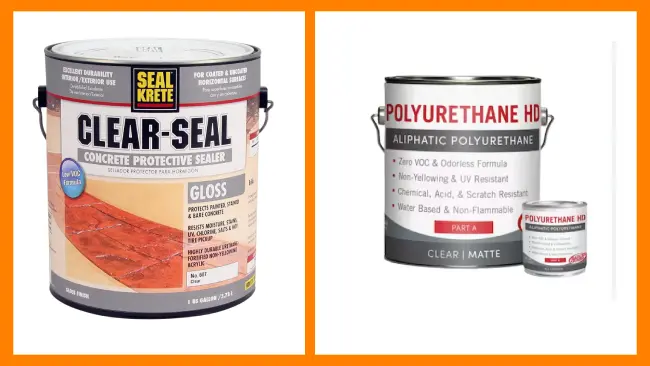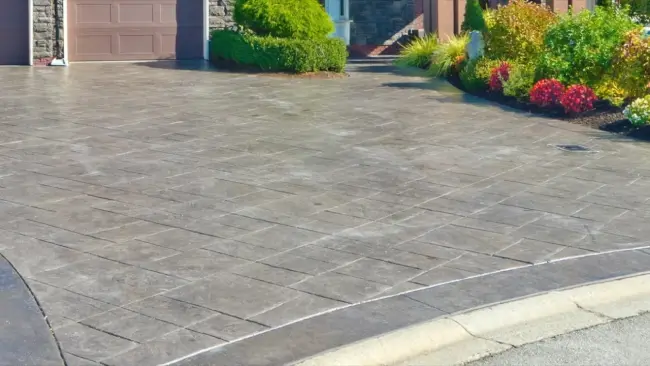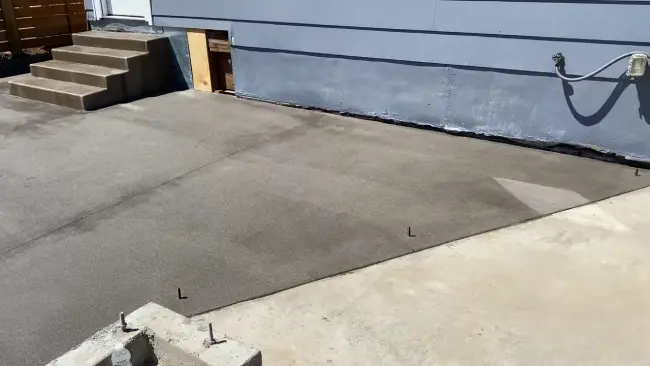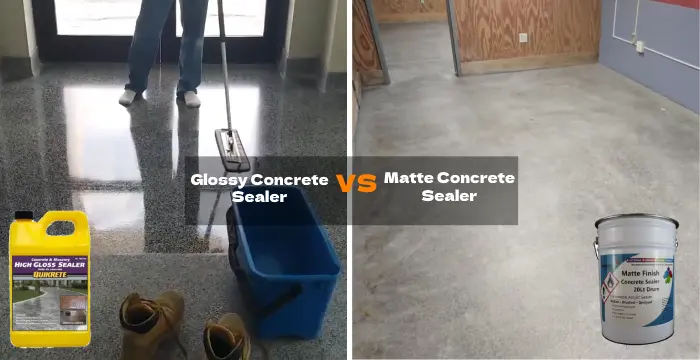A concrete sealer protects the surface from damage and enhances its aesthetic appeal. Glossy and matte concrete sealers are two of the most popular among the many options. These types of sealers differ in appearance, durability, and maintenance requirements.
The key difference between them is the type of finish they create on the concrete surface. A glossy concrete sealer creates a reflective finish that gives your concrete surface a sleek and shiny look. Matte concrete sealer provides a flat finish that is more subdued and absorbs light instead of reflecting it.
Choosing the right sealer for your project depends on understanding their properties and differences. Keep reading to make an informed decision.
Differences Between Glossy Vs Matte Concrete Sealer

Glossy and matte concrete sealers are both popular choices for enhancing the appearance and protecting the surface of your concrete projects. Each type is suited to different settings, so knowing which one is right for you is essential.
ONE: Appearance
Appearance is a crucial aspect of choosing from matte and glossy concrete sealers. A glossy finish creates a shiny, reflective surface that can help enhance the color of stamped or stained concrete surfaces.
It also gives off a sleek, modern appearance that may complement contemporary designs. Although, it tends to show imperfections more prominently than its matte counterpart.
Alternatively, a matte finish provides a non-reflective surface with a more natural look and feel. This type of sealer tends to be less slippery when wet compared to glossy finishes, making it an ideal option for outdoor spaces like patios and pool decks.
Additionally, it is better at hiding minor flaws in the concrete’s surface since it does not reflect light as much as glossier sealers do.
TWO: Materials
The choice between glossy and matte concrete sealers depends on several factors. Glossy sealers offer a shiny finish that creates a wet-look effect on the surface. This type of sealer reflects light more effectively than the matte version, making it ideal for decorative applications such as stamped concrete patios or pool decks.
On the other hand, matte sealers tend to show scratches and scuffs less easily than glossy sealers. Matte sealers provide a natural-looking finish without altering the color or texture of the concrete surface. They have less shine but offer better traction and are suitable for high-traffic areas like driveways or walkways.
Moreover, matte sealers also hide imperfections well, making them perfect for outdoor use where wear and tear are common.
THREE: Durability
While a glossy finish provides a high shine and enhances color depth, it may highlight imperfections on the surface, like scratches or chips. On the other hand, a matte finish has a more natural look that does not reflect much light and is less likely to show wear over time.
When choosing between glossy vs matte concrete sealer, one must consider the level of durability required for their specific application.
Here are two key considerations:
1. Location: Outdoor surfaces will be more durable if they are coated with a glossier finish because they can resist water penetration better than matte finishes.
2. Traffic volume: Matte finishes might not last as long in high-traffic areas because they’re prone to abrasion from friction from foot traffic.
FOUR: Suitable Surfaces
The glossy sealers are perfect for interior decorative concrete floors that don’t get a lot of foot traffic, like in residential homes or retail stores. Homeowners looking to add a stylish touch to their living space should consider this type of sealer because it’s easy to clean and stain-resistant.
Meanwhile, matte sealers are better suited to exterior surfaces like patios, driveways, and walkways that require traction due to frequent foot traffic or vehicle usage. They offer a non-slippery finish and protect outdoor spaces from water damage caused by rain and snowfall.
FIVE: UV and water protection
Moisture is a common problem for concrete surfaces. Rain or snow can seep into the concrete surface and cause cracking and degradation over time. A good sealer forms a barrier that repels water and prevents it from penetrating the surface.
UV radiation is another factor that can cause damage to unprotected concrete surfaces. Sunlight causes color fading, discoloration, and in some cases, structural damage. High-quality sealers contain additives that block out UV radiation.
When choosing between glossy or matte finishes, it is important to consider each option’s effectiveness at protecting against water damage and UV rays. While both types provide excellent moisture protection, glossy finishes reflect sunlight more efficiently because of their reflective properties.
Matte finishes, on the other hand, have low reflectivity, making them ideal for areas with high foot traffic. They don’t create glare that could affect visibility.
SIX: Cost
Aside from aesthetics, the cost is also important when choosing a sealer. Generally, matte sealers tend to be less expensive than their glossy counterparts due to differences in materials used and manufacturing processes.
Still, it’s important to remember that prices may vary depending on brand and quality.
SEVEN: Maintenance
Glossy sealers are highly durable and perfect for high-traffic areas like garages and commercial establishments. Regular cleaning with non-abrasive cleaners and avoiding harsh chemicals is a must to protect the sealer’s sheen.
When the sealer starts wearing off, it’s best to reapply a fresh coat to restore the protective film’s integrity.
On the other hand, matte concrete sealers have a more natural look, but they are less resistant to wear and tear. They require periodic cleaning with mild soap solutions and specialized wax coatings to preserve their low-luster finish for efficient maintenance.
Direct exposure to UV rays can cause unwanted discoloration over time, so it’s best to avoid it as much as possible. Here are a few tips:
* Regularly sweep off dirt and debris from your sealed concrete surfaces.
* Use pH-neutral cleaners when washing down your sealed floors.
* Regularly apply a sacrificial layer (wax coating) on matte concrete surfaces.
What To Consider When Choosing Between Glossy And Matte Concrete Sealers?

When choosing between a glossy and matte concrete sealer, there are several factors to consider.
One of the most important considerations is the level of sheen or shine that you want on your concrete surface. Glossy sealers provide a high level of shine, while matte finishes offer a more subdued look.
Durability is another important consideration. While both types of sealers offer protection against stains and damage such as UV rays, scratches, and water penetration, glossy finishes are more durable than their matte counterparts.
However, glossy sealers may show wear and tear more easily than matte finishes over time.
Also, it’s essential to consider maintenance when selecting a sealer for your concrete surface. A glossy finish typically requires regular upkeep because it can quickly reveal scuffs and scratches from foot traffic or vehicles.
Conversely, matte-finished surfaces don’t require much maintenance since any dirt or dust won’t be noticeable due to their natural dullness.
Is Gloss Concrete Sealer More Slippery Than Matte Sealer?
Regarding slipperiness, a high-gloss concrete sealer is notoriously slippery compared to a matte sealer. This is due to the reflective and smooth nature of the high-gloss finish, which can increase the risk of accidents and injuries, especially on wet surfaces.
The glossy finish can be particularly hazardous around the pool or any flat outdoor area, as the risk of slipping and falling is high. Matte sealer, on the other hand, has a more textured finish, which provides better traction and reduces the likelihood of slips and falls.
Therefore, it is recommended to opt for a matte sealer when safety is a concern, particularly in areas prone to wetness or high foot traffic.
Can gloss concrete sealer be used both indoors and outdoors?
High Gloss Concrete Sealer can be used both indoors and outdoors. Although, it is essential to note that it should only be applied in spaces that are well-ventilated to the outside. These sealers carry a strong odor that may harm individuals if not dispersed adequately.
Due to the pungent odor, using High Gloss Concrete Sealers in basements, occupied homes, or businesses is not recommended. Instead, it is best suited for outdoor use or in large, open spaces with excellent natural ventilation.
It’s crucial to ensure proper ventilation during the application and drying process to avoid adverse health effects. Also, follow all safety instructions and protective measures, such as wearing gloves, eyewear, and a respirator, to protect oneself from exposure to strong chemicals.
How long does matte concrete sealer take to dry?

The estimated time for Matte Concrete Sealer to dry and become touchable is 1 to 5 hours. This duration is subjective to several factors, including temperature, humidity, and the quality of the sealer. Nonetheless, it is essential to note that these conditions may cause variability in the actual drying time.
It is recommended to steer clear of severe weather and temperature variations to achieve optimal outcomes. Also, it is worth noting that the sealer can tolerate moderate foot traffic once it has fully dried. Still, waiting at least 24 hours before subjecting the surface to heavy traffic or cleaning products is advisable.
How long does high gloss concrete sealer take to dry?
High gloss concrete sealer typically takes roughly 48 hours, or 2 days, to dry completely. All forms of activity on the coated surface must be prohibited to ensure the sealant is not disturbed and can dry uniformly. It is crucial to note that while the surface may appear dry on the surface, the sealer can still be wet underneath.
Therefore, it is imperative to allow ample time to completely dry the high gloss concrete sealer before resuming activity on the coated surface.
Choose Your Finish: Glossy or Matte Sealer for Your Concrete Seal
Concrete sealers are important in maintaining concrete surfaces‘ longevity and aesthetic appearance. In selecting a sealer, there are several things to consider, as mentioned earlier. These include the materials used, appearance, durability, suitable surfaces, cost, maintenance, and frequency of reapplication.
Glossy sealers provide a lustrous shine that elevates color and is ideal for embellishing concrete surfaces designed for decorative purposes. On the other hand, matte sealers offer a more organic appearance to the concrete, creating a natural look.
Ultimately, deciding which concrete sealer to use depends on one’s preference and the surface’s specific sealing requirements. Prioritizing these factors is crucial in selecting the ideal sealer to achieve optimal results for the sealed surface.
